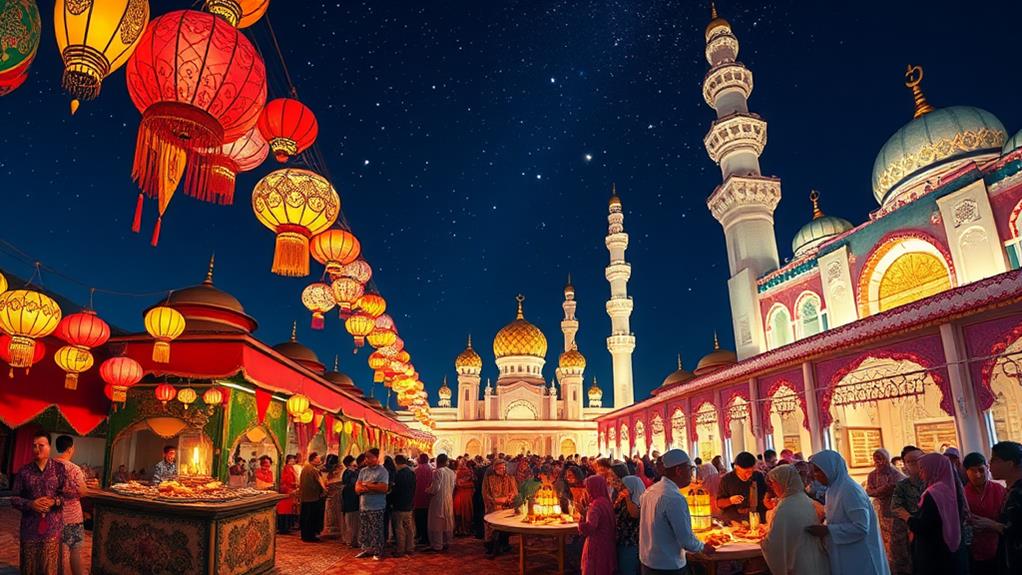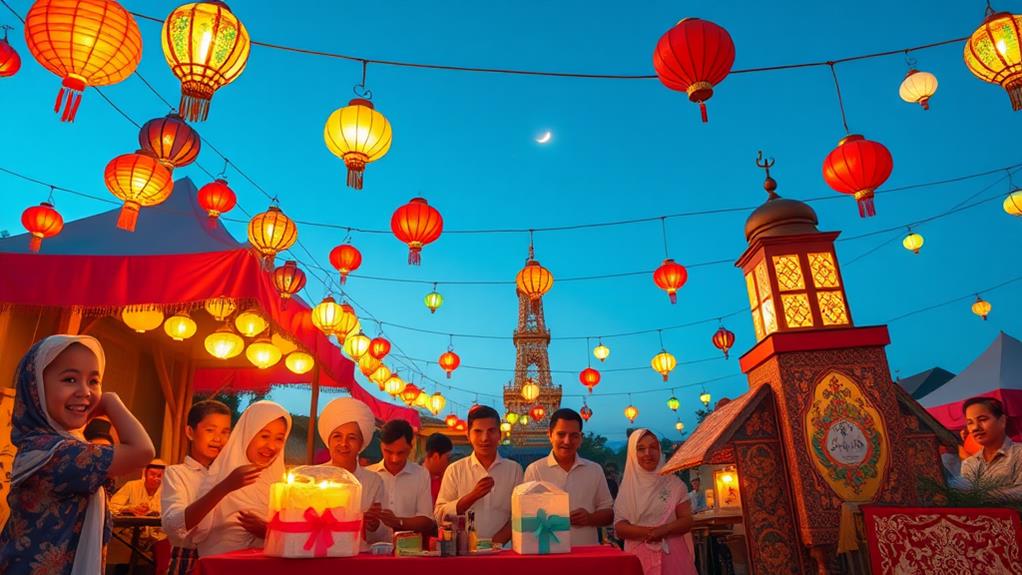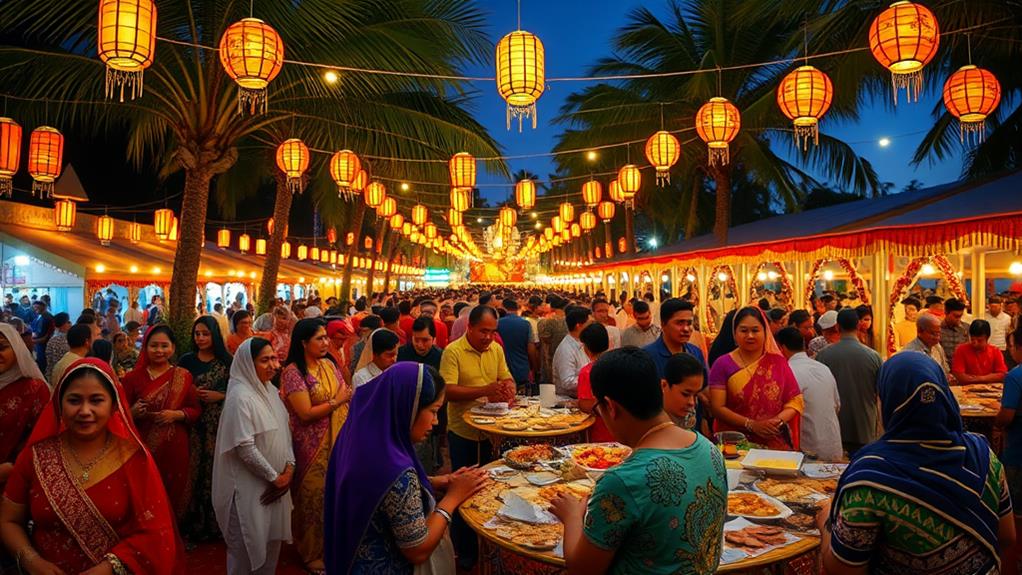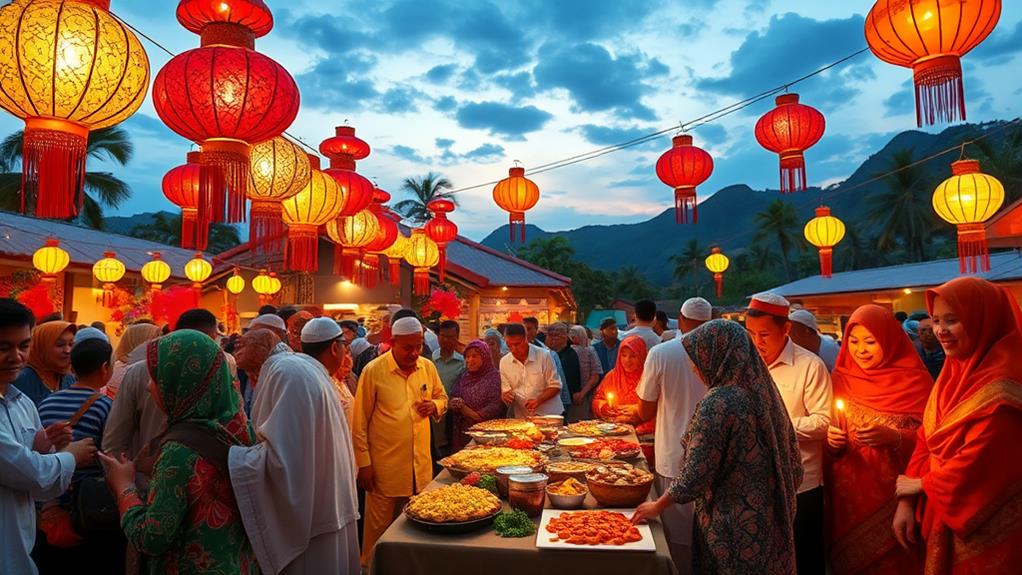Islamic Festivals in the Philippines
In the Philippines, Islamic festivals play a significant role in showcasing the vibrant culture of the Muslim community.
Eid al-Fitr and Eid al-Adha are two prominent festivals that bring the community together. During Eid al-Fitr, Muslims gather for communal prayers and share festive meals, strengthening family bonds and expressing gratitude for Allah's blessings.
Eid al-Adha, also known as the Feast of Sacrifice, involves animal sacrifices that symbolize charity and compassion. These festivals foster social ties and reinforce cultural identity, particularly in regions like Mindanao.
In a predominantly Catholic society, celebrating these festivals helps strengthen community unity.
Overview of Islamic Festivals

Islamic Festivals in the Philippines
Islamic festivals in the Philippines are vibrant expressions of faith and community, primarily centered around Eid al-Fitr and Eid al-Adha. These celebrations are significant events that foster unity within the Muslim community, which makes up approximately 10% of the population.
Eid al-Fitr
Eid al-Fitr marks the end of Ramadan, featuring special prayers, communal feasts, and gift exchanges. This occasion emphasizes gratitude for Allah's blessings and encourages bonds among family and friends.
For instance, during Eid al-Fitr, Muslims gather for special prayers, followed by communal feasts and gift exchanges, strengthening their relationships with loved ones.
Eid al-Adha
Eid al-Adha, known as the Feast of Sacrifice, commemorates Prophet Abraham's obedience to God. This festival involves the ritual sacrifice of animals, with the meat shared among family, friends, and the needy, highlighting the values of charity and compassion.
For example, during Eid al-Adha, Muslims perform the ritual sacrifice of animals, distributing the meat to those in need, demonstrating their commitment to charitable acts.
Celebrations and Solidarity
During these festivals, you'll notice communal prayers and gatherings at venues like Quezon Memorial Circle, showcasing the solidarity of the Muslim community.
Despite being a minority in a predominantly Catholic nation, these vibrant celebrations reflect the rich cultural tapestry and resilience of Filipino Muslims.
Key Celebrations in the Philippines
Celebrations in the Philippines: Eid al-Fitr and Eid al-Adha
Eid al-Fitr and Eid al-Adha are significant celebrations in the Philippines that highlight the unique ways the Muslim community expresses its faith and strengthens social ties.
Eid al-Fitr: A Time for Gratitude
Eid al-Fitr marks the end of Ramadan, the Islamic holy month of fasting. This celebration is filled with special prayers and feasting, emphasizing gratitude and communal gatherings that reinforce bonds with family and friends.
Eid al-Adha: The Feast of Sacrifice
Eid al-Adha, or the Feast of Sacrifice, commemorates Abraham's willingness to sacrifice his son. This celebration emphasizes sharing, featuring the ritual slaughter of animals and distributing meat to the needy.
Key Aspects of These Celebrations
Communal prayers are held at venues like Quezon Memorial Circle and Khalid Bin Alwaleed Mosque. These prayers are attended by thousands of Muslims, strengthening their bond with their faith and community.
The significant attendance in regions such as Mindanao and the Sulu archipelago highlights the importance of these celebrations in the Philippines.
The cultural heritage of the Muslim community is reflected in the festivities, especially in the Bangsamoro Autonomous Region in Muslim Mindanao (BARMM). This region is known for its rich cultural traditions and customs.
Strengthened social ties are a key outcome of these celebrations, as families and communities come together during these important occasions.
Through these vibrant celebrations, Filipino Muslims not only observe their faith but also contribute to a sense of unity and shared cultural identity within the broader Philippine society.
Significance of Eid Al-Fitr

Eid al-Fitr: A Celebration of Community and Gratitude
Eid al-Fitr marks the joyous conclusion to Ramadan, a month of fasting and spiritual reflection, and is a significant occasion for Filipino Muslims.
This celebration embodies the essence of community and gratitude, as thousands gather in mosques and open spaces for Eid prayers, reinforcing unity among Muslim Filipinos.
The practice of Zakat al-Fitr is a key element of Eid al-Fitr. By providing this charity, individuals ensure that less fortunate members of the community can also participate in the celebrations, fostering a sense of inclusivity and compassion.
This act of generosity reflects the core values of Islam, emphasizing that no one should be left behind during significant occasions.
Festive meals are a vibrant display of culinary tradition during Eid al-Fitr. Families prepare and share an array of traditional foods and sweet dishes, reinforcing communal ties and the spirit of sharing.
In the Philippines, Eid al-Fitr celebrations bring together diverse communities, highlighting the rich tapestry of cultural and religious identity that thrives within the nation.
Observing Eid Al-Adha
Filipino Muslims Embody the Spirit of Sacrifice and Community during Eid al-Adha
Eid al-Adha, also known as the Feast of Sacrifice, commemorates Prophet Abraham's willingness to sacrifice his son Ishmael. During this celebration, Filipino Muslims demonstrate their faith and togetherness through various practices.
Unity through Communal Prayers
Early morning gatherings bring the Muslim community together, fostering a sense of unity among believers.
These communal prayers set the tone for the rest of the celebration.
Symbolizing Sacrifice through Animal Sacrifice
The act of animal sacrifice symbolizes gratitude to Allah and the essence of sacrifice.
This practice is a powerful reminder of Prophet Abraham's willingness to sacrifice his son.
Sharing and Generosity through Meat Distribution
After the sacrifice, the meat is divided into three parts: one for the family, one for friends, and one for those in need.
This act of sharing and generosity reinforces the importance of kindness and charity.
A Public Holiday for Broader Participation
Eid al-Adha is recognized as a non-working day, allowing for broader participation in festivities.
This enables more people to come together and celebrate with their families and communities.
Strengthening Community Ties
As families gather in public venues like Quezon Memorial Circle, they reinforce social bonds and cultivate a spirit of inclusivity.
This collective celebration not only honors tradition but also strengthens community ties, making Eid al-Adha a significant occasion in the Philippines.
Rituals and Traditions

Rituals and Traditions in the Philippines During Eid al-Adha
Eid Prayer and Community
The Eid prayer is a crucial ritual during Eid al-Adha in the Philippines, where Filipino Muslims gather at mosques for a special morning service.
During this prayer, they perform two Rakat with seven Takbeers, followed by a sermon that emphasizes community values and responsibilities. This prayer not only serves as a spiritual act but also strengthens communal ties.
Animal Sacrifices and Communal Meals
Animal sacrifices, typically goats or cows, are central to the festivities. This act is both a form of worship and a gesture of thanksgiving, as the meat is shared among family, friends, and those in need.
Families come together to celebrate, reinforcing bonds through communal meals that embody collective joy.
Charitable Acts and Spiritual Connection
During Eid al-Adha, charitable acts are highly encouraged, reflecting the spirit of giving that's integral to the celebration. While Eid al-Fitr is characterized by gratitude for Allah's blessings, Eid al-Adha also incorporates significant events like Shab e Miraj and Ashura, where prayers and reflections deepen the spiritual connection within the Filipino Muslim community.
These rituals and traditions encapsulate a rich tapestry of faith, unity, and shared values.
Community Involvement and Unity
Fostering a sense of community and unity, Filipino Muslims actively participate in various events during Islamic festivals, transforming these occasions into vibrant celebrations of cultural identity.
Thousands gather at venues like Quezon Memorial Circle for prayers and communal feasts, showcasing their commitment to togetherness.
Community involvement during Islamic festivals emphasizes several key aspects:
Charitable acts strengthen communal ties. For instance, sharing meat from sacrifices during Eid al-Adha brings the community closer together.
Events serve as moments for reflection on historical challenges. Eid celebrations, for example, serve as a reminder of the historical challenges faced by the Bangsamoro Autonomous Region in Muslim Mindanao (BARMM).
Government recognition of Islamic holidays promotes inclusivity. The recognition of Islamic holidays as national holidays fosters a sense of inclusivity within Filipino society.
Celebrations encourage interfaith dialogue. These events provide opportunities for interfaith dialogue, bridging gaps between diverse communities.
These festivities not only highlight community resilience but also serve as essential platforms for unity and support.
By participating in these events, Filipino Muslims nurture a collective identity, embracing their heritage while contributing to a more harmonious society.
Simbang Gabi, a filipino christmas tradition, is not directly related to Islamic festivals and celebrations in the Philippines. However, it reflects the country’s diversity and tolerance of different religious practices. It is a testament to the inclusive spirit of the Filipino people during the holiday season.
Cultural Impact of Islamic Events

Islamic Festivals Shape Cultural Landscape
Islamic festivals in the Philippines significantly impact the cultural landscape, blending religious practices with broader societal values. Approximately 12 million Muslims celebrate these events, emphasizing community unity and the importance of shared experiences.
Eid al-Fitr and Eid al-Adha: Community Building
Eid al-Fitr and Eid al-Adha are two significant Islamic festivals marked on the Islamic Calendar. These events bring large gatherings at notable venues like the Quezon Memorial Circle, where communal prayers and feasting foster a sense of community.
The act of sharing meat from sacrificial animals during Eid al-Adha reflects Abraham's willingness to sacrifice, serving as a powerful reminder of faith and selflessness. This ritual strengthens community bonds and instills values of charity and generosity.
Government Recognition Fosters Inclusivity
The government's recognition of these festivals as public holidays promotes inclusivity, allowing all Filipinos to appreciate the rich cultural heritage embedded in these celebrations.
This recognition enhances cultural awareness among the broader Filipino society, promoting understanding and respect across diverse religious landscapes.
Islamic Events Shape National Identity
In essence, Islamic events play a critical role in shaping a more harmonious and interconnected national identity.
They reflect on historical struggles, particularly in the Bangsamoro Autonomous Region, and promote a deeper understanding of the cultural heritage of Muslim communities in the Philippines.
Notable Islamic Dates in 2024
Notable Islamic Dates in 2024
The Islamic calendar is a lunar calendar, and its dates vary each year. In 2024, March 10 marks the start of Ramadan, a month of fasting, prayer, and introspection for Muslims. During this period, Muslims fast from dawn to sunset, abstaining from food and drink.
This observance culminates in Eid ul Fitr, which is expected to fall on April 9, a day of celebration and gratitude.
The Hajj pilgrimage to Mecca is a significant event in the Islamic calendar. In 2024, it's anticipated to take place from June 6 to June 11. This pilgrimage is a once-in-a-lifetime obligation for Muslims who are physically and financially able.
The Hajj culminates in Eid ul Adha, which is expected to fall on June 16. This festival commemorates Ibrahim's willingness to sacrifice his son, emphasizing themes of faith and sacrifice.
Key dates to note for 2024 include:
- March 10: Start of Ramadan
- April 9: Eid ul Fitr
- June 6-11: Hajj pilgrimage
- June 16: Eid ul Adha
Questions and Answers
What Are the Major Islamic Festivals?
Major Islamic Festivals: Eid al-Fitr and Eid al-Adha
Islamic festivals revolve around prayer practices and cultural significance.
Eid al-Fitr marks the end of Ramadan, the Islamic holy month of fasting, fostering gratitude and community spirit. This festival celebrates the completion of Ramadan, a period of spiritual growth and self-reflection. During Eid al-Fitr, Muslims gather for prayer, exchange gifts, and share meals with family and friends.
Eid al-Adha, on the other hand, focuses on sacrifice and charity. This festival commemorates the willingness of Prophet Ibrahim to sacrifice his son Ismail as an act of obedience to God.
Eid al-Adha emphasizes the importance of devotion and generosity, as Muslims sacrifice animals and distribute meat to the poor and needy.
Both Eid al-Fitr and Eid al-Adha strengthen bonds among families and communities, reflecting the values of unity and generosity inherent in Islamic culture.
What Is Hari Raya in the Philippines?
Hari Raya, a significant cultural celebration in the Philippines, marks the end of Ramadan.
This festival is characterized by communal prayers and feasting, emphasizing community spirit and unity. During Hari Raya, families and friends gather to share traditional dishes and engage in Zakat al-Fitr, a charitable act that promotes gratitude and generosity.
This celebration not only strengthens familial bonds but also reinforces shared values within the community.
How Is Eid Al-Adha Celebrated in the Philippines?
Eid al-Adha Celebrations in the Philippines
In the Philippines, Eid al-Adha is celebrated with meaningful community gatherings that highlight the cultural significance of the occasion.
These gatherings begin with a special morning prayer, followed by a sermon that fosters unity among attendees.
Traditional Dishes
After the prayers, families prepare traditional dishes using the meat from sacrificed animals.
They share portions with friends and the less fortunate, which underscores the spirit of charity.
This act of giving makes the celebration not just a feast, but a profound expression of gratitude.
What Is Eid Al-Fitr and Eid Al-Adha?
Eid al-Fitr and Eid al-Adha are two significant Islamic festivals.
Eid al-Fitr marks the end of Ramadan, a month of fasting. During this festival, Muslims engage in communal prayers and reflect on their spiritual journey throughout the month.
They break their fast and celebrate with family and friends, exchanging gifts and sharing meals.
Eid al-Adha commemorates Prophet Abraham's devotion to God through sacrifice. This festival highlights the importance of generosity and obedience to God's commands.
It is celebrated by sacrificing an animal, usually a goat or sheep, and distributing the meat to the poor and needy.
Both festivals emphasize important values in Islamic teachings, such as community bonding, gratitude, and charity.
They bring Muslims together, strengthening their bonds and promoting a sense of unity and compassion.